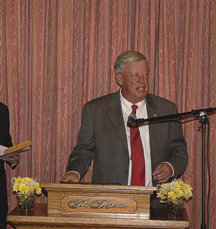While the overall county tax rate is rumored to be going up this year, Secaucus residents will pay a lower rate because the town’s property values did not rise as much as they did in previous years.
Secaucus officials were told at an April 28 meeting with county officials that residents will see a $600,000 drop in their 2010 Hudson County tax levy, which amounts to a 26-cent decrease for every $1,000 of property owned by a resident.
This means that a homeowner with property assessed at the town average of $165,000 will pay about $42 less in county taxes in the next fiscal year, starting when the next tax bills are issued.
A municipality’s county tax rate can fluctuate from one year to the next.
________
Overall, Hudson County property owners pay taxes for their municipality, local schools, and the county. Although the three tax bills are combined in each quarterly bill, taxes for each entity are decided independently of one another.
News that county taxes will drop for local property owners comes just weeks after voters approved the $32.18 million Secaucus School District budget for the 2010-2011 school year. That budget calls for a 2.5 percent tax increase to help offset a $1.6 million loss in state aid.
The Secaucus Town Council has yet to introduce its 2010 municipal budget, but officials say it should be released sometime this spring. In each of the last two years, the municipal budget has included small tax increases. In 2008, the council approved a $42.9 million budget. In 2009, the budget was $44.29 million.
How county taxes work
The county tax rate each municipality pays is based on the overall value of ratables (taxable properties) in the town. Unlike municipal taxes, which are based on an assessed value that does not change dramatically from year to year, county taxes are based on the actual value of property as calculated by the sale of property within a municipality. This means a municipality’s county tax rate can fluctuate from one year to the next depending on sales figures.
Under a formula that municipalities sometimes find unfair, towns that experience the most robust real estate sales also pay the most in county taxes. For example, real estate in Hoboken sold at a significantly higher rate last year, and home values there held steady, which may increase its tax obligation to the county.
Drumeler attributes the coming tax break for Secaucus to two factors.
“First, some our ratables have gone down due to tax appeals and, second, we haven’t had a whole lot of new development this year,” he said.
County budget to be introduced this week
Secaucus’ tax reduction will be reflected in Hudson County Executive Tom DeGise’s 2010 county budget, which he is scheduled to present to the Hudson County Board of Chosen Freeholders this Wednesday, May 12. The freeholders will vote on whether to introduce the budget the next day, May 13. After that, there will be a public hearing on the budget weeks later, when the public can give suggestions or comments. That hearing has not yet been scheduled. The freeholders could take a final vote on the spending plan in June.
The total 2010 county budget has not been released to the public. The approved 2009 budget was $398 million.
Hudson County has for years experienced rising personnel costs and declining non-tax revenues.
Investment revenues and interest on deposits dropped $2.8 million, or about 83 percent, over the last five years. Fixed costs for pensions, healthcare, and aid to the disadvantaged jumped by similar rates during the same period. Police and fire pension costs rose by 800 percent and healthcare by 35 percent. Non-tax revenues have dropped $8.5 million, or 56 percent.
The county has modified the impact of health care costs by offering an incentive program and requiring that employees pay into their own health insurance, for a savings of about $1 million a year.
E-mail E. Assata Wright at awright@hudsonreporter.com.
